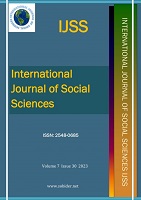Eğitim Yönetiminde Liderlik Yaklaşımları Bağlamında Paternalist Liderliğin İncelenmesi
Examination of Paternalistic Leadership in the Context of Leadership Approaches in Educational Administration
Author(s): Serdar ErginSubject(s): Business Economy / Management, State/Government and Education, Management and complex organizations, Socio-Economic Research, Sociology of Education
Published by: SD Yayınevi
Keywords: Educational Management; Leadership; Paternalistic Leadership;
Summary/Abstract: Paternalism is when a person or an institution makes decisions for their benefit by interfering with the life, freedom, decisions of another person or group. This intervention usually occurs when a strong figure is directed at a weak figure, or when a person's ability to decide on his own life is restricted. Paternalism has an important characteristic feature in social culture. It is more common in the East due to its self-evident structures in terms of cooperation and power. The differences between east and west have necessitated many different attitudes and behaviors in business life as Decently as in social life. In this case, it has led to the emergence of different leadership styles. Paternalism historically deals with the totality of beliefs and practices that occurred in the west during the transition period from the social class order of patriarchal class structures to a free society consisting of autonomous and equal individuals. Paternalistic leadership in Turkey is a leadership style that has existed for many years. Especially in the early years of the Republican period, under the rule of the founding leader Atatürk, paternalistic leadership played an important role in the modernization and development process of the country. Paternalistic leadership in Turkey is based on the understanding that the leader is sensitive to the needs of society and makes efforts to increase the wellbeing of society. These leaders consider themselves a part of society and make decisions taking into account the general interests of society. These leaders respect the traditional values of society and make efforts to protect these values.
Journal: Uluslararası Sosyal Bilimler Dergisi
- Issue Year: 7/2023
- Issue No: 30
- Page Range: 104-118
- Page Count: 15
- Language: Turkish

